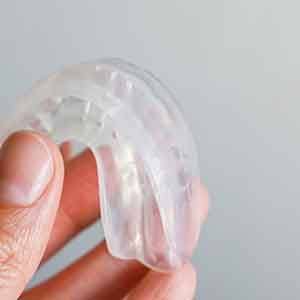Emergency Dentist – Mineola, NY
In Dental Pain? Need Help? Call Now!
No one expects a dental emergency to pop up and ruin their day, but roughly 1 in 6 Americans finds themselves in this kind of situation every year. If you or a loved one happens to end up in this unlucky group, don’t worry, because help is available right around the corner. Give Meadowbrook Dental Care a call, and we’ll gladly schedule a same-day appointment to provide the relief you need right away with emergency dentistry in Mineola, NY.
Why Choose Meadowbrook Dental Care for Emergency Dentistry?
- Same-Day Emergency Appointments
- Soothing Sedation Options
- Kind & Highly Experienced Team
How We Treat Dental Emergencies

To stop the pain and repair the damage caused by a dental emergency, we typically follow these four steps:
- Schedule an Appointment: We’ll make time to see you as soon as possible for an emergency examination. It’s generally ideal if you can get to our office on the same day as your call.
- Emergency Examination: Obviously, treating your pain is always one of our top priorities, but the only way we can truly put a stop to your emergency is to narrow down what’s causing it – hence why we’ll need to examine your smile and capture X-rays of your mouth and jaw.
- Review Findings: We’ll explain your oral health situation as clearly as possible. Then, we’ll go over your options for treatment and create a plan that’s right for your grin (as well as your budget).
- Give Your Smile the Care It Deserves: Your emergency plan could involve personalized crowns, root canal therapy, and other treatments depending on what your underlying problem is.
The Most Common Dental Emergencies
What counts as a dental emergency? We’ll make this easy for you: if you or a family member experience any painful or out-of-the-ordinary oral symptoms, go ahead and contact our dental office. We’ll let you know what to do at the moment and tell you whether or not you should come to see us right away. In the meantime, here are some of the most common dental emergencies we see.
Understanding the Cost of Emergency Dentistry

Simply put, there is no set price for emergency dentistry. Of course, that doesn’t mean that our Mineola dental team won’t go the extra mile to make understanding the cost and the financial solutions available easy. We always do our best to be as transparent as possible so there aren’t any unwanted surprises at the end of your visit. Until then, you can read on to learn more about the cost of emergency dentistry, including why every situation is unique.
Every Dental Emergency is Different

As we mentioned above, there isn’t a flat fee for emergency dentistry. Instead, the cost of your care will be based solely on the type and degree of your injury as well as the procedure needed to address it. In other words, we need to consider the root of the problem, the extent of the damage, and which restorative or cosmetic dental care is needed to restore the look, health, and function of your smile. Then, we can create your treatment plan and, in turn, pinpoint the price.
Remember, for both your teeth and your wallet, it is always better to come to see us sooner rather than later, as this allows us to take care of an issue before it becomes more advanced.
Does Dental Insurance Cover Dental Emergencies?

You’ll be happy to hear that dental insurance providers often cover a portion of the cost of emergency dental care in one way or another. For some, that may be a complimentary emergency exam annually. For others, that may be covering 50% or more of the cost of the necessary restorative care. For that reason, it’s worth taking a look at the fine print on your dental plan to see what’s included! Since our team at Meadowbrook Dental Care offers in-network savings and welcomes out-of-network providers, we can help as well, so don’t hesitate to get in touch with any questions you have.
Other Options for Making Dental Emergencies Affordable

If you currently aren’t insured, then ask us about our other financial solutions, including:
- Our Dental Savings Plan – Joining will give you access to considerable benefits, including unlimited examinations and 20% off basic and major services. Unlike dental insurance, however, you won’t have to worry about waiting periods, annual maximums, and other red tape.
- Flexible Financing – If you can’t pay for the entire cost of your emergency dental treatment in one lump sum, don’t worry – that’s where flexible financing comes in. With trusted third-party financiers like CareCredit, you can choose a payment plan that works with your budget.
Take Care of Your Smile, Save Money!

Although accidents can’t always be prevented, it’s important to remember that there are several things in your control that can help protect your teeth and gums. A great example is adopting a solid oral hygiene regimen, including brushing for a full two minutes each day and flossing consistently. You should also keep foods and drinks with added sugar to a minimum, wear a mouthguard during sports, and avoid using any products with tobacco. This will help keep your smile and your wallet healthy!
Keys to Preventing Dental Emergencies

Since dental emergencies can be stressful to handle and painful to experience, it’s only natural to want to avoid them at all costs. Fortunately, lowering your risk of sustaining a serious dental injury is fairly simple, given that you keep a few practices in mind. Here are some examples:
Visit Your Dentist Twice a Year

Like most dental problems, tooth decay may start small, but it can lead to more serious issues over time. That’s why we strongly recommend coming in for a dental checkup twice a year! These routine exams help to prevent small issues from turning into emergencies. Plus, we conduct a comprehensive cleaning as well, which ensures that plaque and tartar are cleared away before they lead to painful dental problems, like gum disease.
Consistently Brush and Floss

Of course, maintaining a solid oral hygiene regimen at home is important too. If you have fallen out of the habit of taking good care of your smile, that’s okay – there’s no time like the present to start over! First, use a soft-bristled toothbrush and fluoridated toothpaste to brush your teeth each morning and evening (for two full minutes each time). Second, floss and rinse with mouthwash daily. Together, these habits will help prevent a wide range of problems, including painful cavities.
Eat Well-Balanced Meals

Simply put, what you eat matters. If you consistently overindulge on foods and drinks with added sugar, then you’re more likely to develop a cavity. Similarly, if you munch on particularly hard or crunchy foods, you’re at an increased risk of chipping, cracking, or fracturing a tooth. We recommend instead adding as many nutrient-dense, smile-friendly foods to your diet as possible, including fresh fruits and vegetables, to help keep your teeth and gums happy and healthy.
Wear a Mouthguard During Sports

Even if you participate in a non-contact sport, like skateboarding, it’s possible for you to damage a tooth or sustain a soft tissue injury in a bad fall. That’s why people who participate in any kind of physical activity – even weightlifting and running – are encouraged to wear one. You’ll need one that fits comfortably and is the appropriate thickness as well, so don’t hesitate to get in touch with us to have one made.
Quit Unhealthy Dental Habits

People often think of smoking when it comes to unhealthy dental habits. However, that’s just one of the many ways you can damage your teeth and gums. That’s why we recommend avoiding other common habits, like using your teeth to open packages, biting your nails, or chewing on ice, pens, pencils, and other hard, non-food items.
Dental Emergency FAQs
Will My Toothache Go Away on Its Own?
We don’t recommend you wait and see if a toothache will go away by itself. This is because your pearly whites are unable to heal themselves. Once your teeth have been damaged, decayed, or infected, you’ll need to seek professional dental treatment as soon as possible to address the issue. For this reason, if you notice any type of discomfort in your smile or indications of a problem, don’t hesitate to give our office a call. We’ll be able to treat the issue before it becomes worse.
If I Have a Toothache, Do I Need a Root Canal?
Toothaches can be due to several kinds of issues, from cavities to dental infections or abscesses. The way our team will address your situation will depend on the root cause. Some of our common treatments for toothaches involve crowns, fillings, nightguards for bruxism, gum disease therapy, and even antibiotics.
One of the main reasons you would require a root canal is to save an infected tooth from needing to be extracted. While this procedure may seem daunting, the process itself is rather straightforward and stress-free. Not only will we make sure you’re as comfortable as possible throughout your treatment, but most patients also feel it’s as quick and easy as getting a large filling.
Is Emergency Dental Care Expensive?
Our team understands the importance of being able to afford any necessary treatments. Dental emergencies that aren’t addressed right away can be detrimental to your overall health as well as drive up the cost of your procedures in the long run. If you suspect an urgent situation, be sure to reach out to us immediately. Most dental emergency treatments can receive 50-80% coverage from dental insurance. Our team can help review the details of your policy so that you can make the most of your benefits. We can even offer alternative financing options through third-party financiers like CareCredit to split up the cost of your emergency care into budget-friendly monthly installments.
Should I Go to the Emergency Room for a Dental Emergency?
You should only go to your local ER if your dental emergency involves life-threatening symptoms, including:
- Bleeding that persists longer than 10 minutes
- Swelling that makes it difficult to swallow or breathe
- A broken or disjointed jaw
For any other dental issues, be sure to bring them to our attention. Whether it’s a severe toothache or a broken or knocked-out tooth, getting treatment from our team will save you time, money, and stress. Most ERs only alleviate tooth discomfort temporarily. But with our expertise and services, we can address the root cause of your dental emergency and restore your oral health!
I Need a Checkup & Cleaning I Have a Cavity or Broken Tooth I am Missing One or More Teeth I Want to Enhance My Smile I am Scared of the Dentist View Our Services
